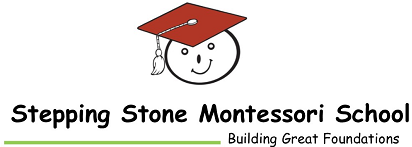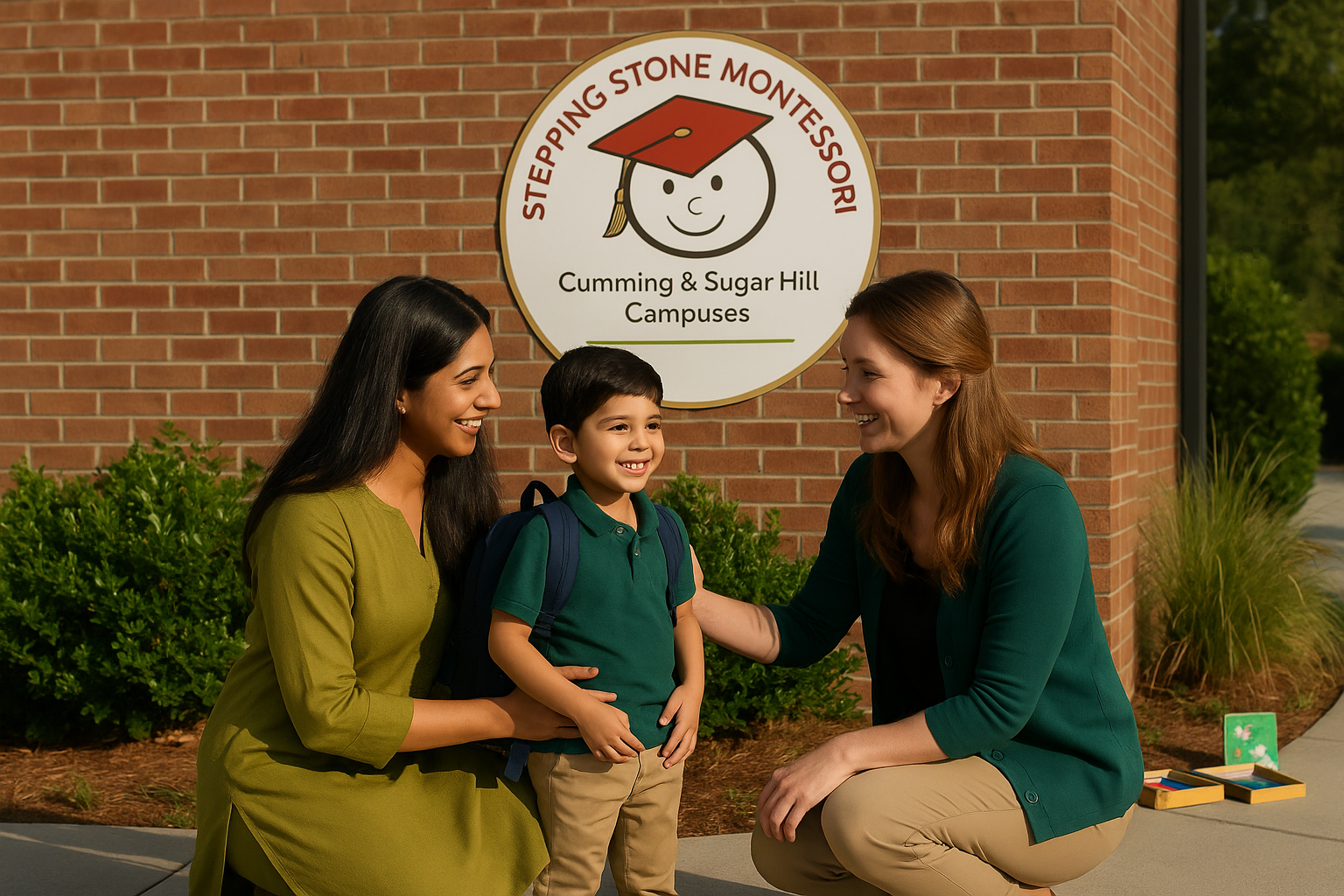Welcome Parents
Thank you for taking the time to learn more about Stepping Stone Montessori School. Each day at our school is an exciting new opportunity to enrich the minds of our students, and we hope your child will join us.
Stepping Stone Montessori School welcomes students regardless of race, gender, or national and ethnic origin and is non-discriminatory in all our policies. We accept children between the ages of 6 weeks and 6 years old.
There are no specific academic entrance requirements; however, we base admission decisions on many factors, especially your child’s age and suitability for our program.
Please contact us regarding availability for your child and to schedule your personal tour of our school. We will be happy to answer your questions and provide additional information about our educational programs.
Admissions Process
We know it’s not easy to select the right school for your child. Our admission process makes it easier!
1. Visit us for a scheduled guided tour of our school.
2. Observe one of our classrooms for 30 minutes to see how our certified Montessori instructors interact with our students. You’ll notice how well the children interact and self-direct their activities, sharing with others and learning at their own pace.
3. Submit your application. Once you decide to enroll your child, you’ll complete an application and submit your $200 non-refundable application fee.
FAQs
Are Montessori children successful later in life?
Research studies show that Montessori children are well prepared academically, socially, and emotionally for later life. In addition to scoring well on standardized tests, Montessori children are ranked above average on such criteria as following directions, turning in work on time, listening attentively, using basic skills, showing responsibility, asking provocative questions, showing enthusiasm for learning, and adapting to new situations.
Are Montessori schools religious?
No. Montessori educates children without reference to a religious denomination. As a result, our classrooms are extremely diverse, with representation from all peoples, cultures, and religions.
Does my child need to attend 5 days?
Young children need consistency with their caregivers and peers in order to feel secure. Gaps in time between days off or out sick can make adjustments more difficult for the child.
How do I know what they are learning?
Classroom observations and Parent – Teacher Conferences are available throughout the year to discuss your child’s progress. Children on their own will share their experiences in the classroom. You will recognize a sense of independence in the child and caring for the community.
How will my child transition to a traditional school?
Montessori students completing the Primary 3 Year cycle have a strong foundation in academics and are most all reading at some level and practicing arithmetic with confidence and so academically, it is most likely that your child will be advanced entering a traditional first grade. Socially, Montessori kids have had the wonderful opportunity to be a part of a kind and thriving community and, during their third year, experienced being the leaders of the class. They are confident and have an inner knowledge of themselves. No matter where your child goes after Primary – they will be happy, open-minded, and prepared.
Is it true that Montessori children never play?
All children play! They explore new things playfully. They watch something of interest with a fresh open mind. They enjoy the company of treasured adults and other children. They make up stories. They dream. They imagine. This impression stems from parents who don’t know what to make of the incredible concentration, order, and self-discipline that we commonly see among Montessori children. Montessori students also tend to take the things they do in school quite seriously. It is common for them to respond, “This is my work,” when adults ask what they are doing. They work hard and expect their parents to treat them and their work with respect. But it is joyful, playful, and anything but drudgery.
What does AMI mean?
Association Montessori International was founded in 1929 by Maria Montessori to maintain the integrity of her work in developing the Montessori Method.
What does Montessori mean?
It is an educational approach created by Dr. Maria Montessori, an Italian Physician, in 1907. The curriculum respects the child’s natural development and offers independence and freedom with limits. The curriculum allows for self-construction and spontaneous activity. The classrooms are mixed-aged, materials are hands-on, and lessons are individualized and realistic.
Why Do Most Montessori schools ask young children to attend five days a week?
Two- and three-day programs are often attractive to parents who do not need full-time care; however, five-day programs create the consistency that is so important to young children and which is essential in developing strong Montessori programs. Since the primary goal of Montessori involves creating a culture of consistency, order, and empowerment, in Primary five days are required. Infant and Toddler classes may allow part-time programs also.
Why mixed ages?
This combination allows for cooperation and mentorship. Older students guide the younger students, who in return admire their older peer’s independence and leadership skills.
Will my child choose whatever he wants to do?
All Montessori lessons are initially introduced by the lead Guide (Directress) to ensure the child’s readiness for the material and to lure the child to exciting new experiences. Once the child is successful working on the lesson independently, he/she may choose it anytime it is available. Thus, providing the child freedom of choice. The child may not choose a lesson that has not yet been presented to him as he may not be yet ready for that lesson or level of challenge. The teacher will observe and introduce further challenging materials once the child has mastered the current lesson. Young students will have many new lessons with a teacher, while older students who have had 2 – 3 years in the class will choose more independently throughout the five areas of the curriculum.
Will my five-year-old be challenged in his/her third (kindergarten) year?
Yes, the advanced Primary curriculum will lead your student into in-depth experiences with Arithmetic, addition, multiplication, subtraction, and division. Reading and writing skills are challenged with story writing and grammar lessons. Science, Geography, Botany, Zoology, Art, and Music are very advanced and are all interconnected in the Montessori Curriculum. The third and fourth year is like the metamorphosis of the Butterfly. The Chrysalis cracks open and the educated child is revealed with a natural love of learning and a strong sense of self!
| Montessori Approach | Traditional Method |
|---|---|
| Emphasis on cognitive and social development | Emphasis on social development |
| Teacher has unobtrusive role in classroom | Teacher is center of classroom as “controller” |
| Environment and method encourage self-discipline | Teacher enforces discipline |
| Mainly individual instruction | Group and individual instruction |
| Mixed age grouping | Same age grouping |
| Grouping encourages children to teach and help each other | Most teaching done by teacher |
| Child chooses own work | Activities structured for child |
| Child works as long as he wishes on chosen project | Child generally allotted specific time for work |
| Child discovers own concepts from self-teaching materials | Child is guided to concepts by teacher |
| Child sets own learning pace | Instruction pace usually set by group |
| Child spots own errors from feedback on material | If work is corrected, errors usually pointed out by teacher |
| Child reinforces learning by repetition and feelings of success | Learning is reinforced externally by repetition and rewards |
| Organized program for learning care of self and environment (polishing shoes, cleaning the sink, etc.) | Less emphasis on self-care instruction |
| Child can work where he chooses (yet not disturb work of others); group work is also encouraged | Child usually assigned own chair; encouraged to participate, sit still and listen during group sessions |
Experience why our children are HAPPY to learn!
Have A Question?
We tried to think of everything, but if you have a question please let us know! We aim to respond to all inquiries quickly, with our office being open Monday to Friday, 7 a.m. to 6 p.m.
Stepping Stone Montessori School, Cumming
Stepping Stone Montessori School, Suwanee

